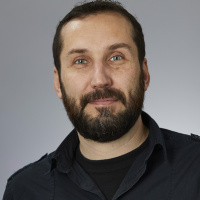Assessing circular economy progress in urban areas - An Industrial Ecology perspective

Asterios Papageorgiou at the Department of Sustainable Development, Environmental Science and Engineering, will publicly defend his doctoral thesis on 26 May 2025.
What is the topic of your Doctoral Thesis?
My doctoral thesis is in Industrial Ecology and seeks to advance knowledge on approaches to monitor and assess progress toward the circular economy in urban areas. It investigates how indicator-based frameworks and urban metabolism assessment methods, such as Material Flow Analysis and Life cycle Assessment, can support informed decision-making within the context of the circular economy.
Why did you choose this topic?
Prior to pursuing my doctoral studies, I completed a Licentiate thesis assessing the environmental performance of different technologies (i.e., solar microgrids and biochar systems) that can be implemented in urban settings to contribute to achieving sustainable urban development. This research made me realize that achieving sustainable urban development requires not just technological solutions, but a fundamental shift in how cities are planned and developed. This insight sparked my interest in the circular economy as a means to drive that change, motivating me to pursue a PhD focused on assessing progress toward a circular economy at the urban level.
What are the most important results?
My thesis offers insights into the applicability, utility, strengths and limitations of indicator-based frameworks and urban metabolism methods as tools for monitoring and assessing circular economy progress at the urban level. While my research emphasizes the utility of these methods, it also shows that using them in isolation can only provide fragmented and incomplete insights. To address this, the thesis advocates for their integration and introduces a novel framework that integrates these methods to provide enhanced insights into material and energy flows, environmental impacts and urban circularity. Thus, another important contribution of my thesis is the development of the framework and practical insights into its strengths and weaknesses gained from its application to the urban area of Umeå, Sweden.
Did you come across something unexpected during your thesis research?
What surprised me most during my research was the often-limited availability and accessibility of good-quality data needed to apply the methods used in my thesis. This made the application of these methods to my case study area (Umeå) particularly challenging. This is why I repeatedly emphasize throughout the thesis that advancements in circular economy assessment in urban contexts can only be achieved if significant improvements are made in the availability, accessibility, and quality of urban-level data.
Who will benefit from your results? What kind the impact may it have on surrounding society?
The findings of this thesis can be valuable to policy makers, urban planners, practitioners, and researchers worldwide, by offering insights into how indicator-based frameworks and urban metabolism methods can be used to support decision making within the context of the circular economy. These insights can guide the application of such methods in diverse urban settings and inspire further research to enhance their effectiveness and relevance. Furthermore, the assessment framework developed in the thesis can serve as a decision-support tool, helping various decision makers assess the urban metabolism and circularity of different urban areas.
Overall, through this thesis, I hope to contribute to advancing knowledge on approaches to assess circular economy progress in urban areas, ultimately aiding decision makers in designing and implementing impactful urban-level circular strategies, which is an essential step toward sustainable urban development.
What will you do next and where can one reach you?
I am currently based in Stockholm, where I have been working as a Senior Environmental Specialist at Klimato since 2023. In this role, I lead advanced research within the science team, with a primary focus on Life Cycle Assessment (LCA) and Greenhouse Gas (GHG) emissions accounting (Scopes 1, 2, and 3) in the food sector. In addition to my role at Klimato, I also work as a part-time lecturer at DIS – Study Abroad in Scandinavia (Stockholm), where I teach the course Engineering Sustainable Environments in Scandinavia to undergraduate students from the United States.
